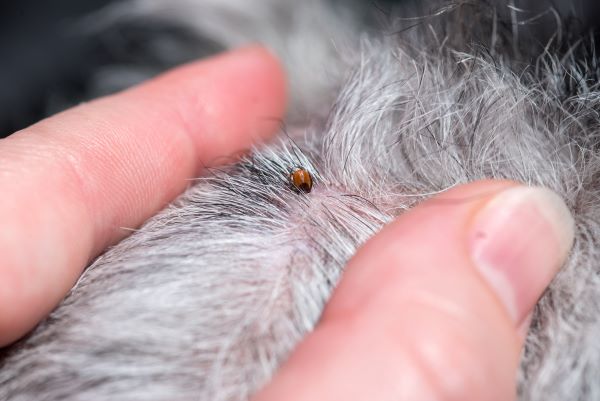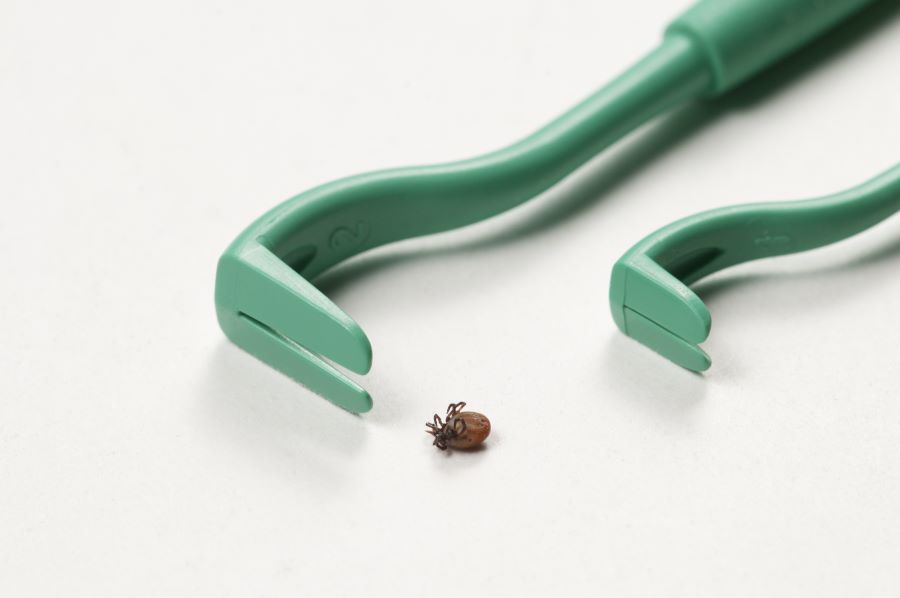Vets are warning pet owners to be extra vigilant as ticks “go nuts” on the Sunshine Coast and another deadly tick-borne disease spreads into Queensland for the first time.
Earlier this year, Biosecurity Queensland announced a new case of the tick-borne disease ehrlichiosis, involving a dog that tested positive in North-West Queensland.
While Maleny Vet Dr Indiana Conway said they had seen not seen any ehrlichiosis cases yet, she urged dog owners to be on high alert for the notifiable disease which is spread from infected brown ticks.
“It is definitely something that we keep an eye out for when we see animals with clinical signs that match. It’s definitely on our radar,” she said.
The disease first appeared last year in Western Australia last year and cases have also been confirmed in the Northern Territory.
RSPCA communications manager Emma Lagoon confirmed the charity’s shelters had not seen any new cases of ehrlichiosis locally yet either.
Symptoms of ehrlichiosis infection in dogs can include:
- fever.
- lethargy.
- loss of appetite.
- weight loss.
- swelling of chest or front legs.
- cloudy eyes or conjunctivitis.
- pain and stiffness.
- bleeding disorders such as nosebleeds or bruising on the gums or belly.

Vets are cautious of the possibility the disease could spread through the region and, while the bacteria were potentially deadly for dogs, Dr Conway said the disease is preventable and treatable.
“A lot of the population in the area do have animals on tick prevention, but the ones that aren’t, are very much at risk,” Dr Conway said
“Tick prevention is so important and cheap and preventable. The alternative is spending thousands of dollars to treat … and it can be devastating when it goes bad.”
While Queensland’s tick season is said to run from August through to March, Dr Conway said that wasn’t entirely the case in our region, with vets treating tick paralysis in pets all year round.

“It’s more prolific in the summer months because ticks breed when it’s hot and wet conditions,” Dr Conway said.
“That’s the main reason we’ve seen so many of them this year especially up here at Maleny and the Sunshine Coast – as soon as the heat comes on, they explode.”
Since the weather has turned, Dr Conway said numbers of tick paralysis in pets were on the rise with about 50 cats and dogs with symptoms being brought to her clinic since early September.
“They are everywhere at the moment, it’s crazy,” Ms Conway said. “They’ve gone nuts.”
She said more animals are presenting than last year because of the wetter and hotter weather the region has experienced.
“All of the animals we’ve had in with tick paralysis have not been on prevention,” she said.
“But compared to ten years ago we are seeing fewer – because we’ve got more preventative products available these days.
“Clients come in and they say ticks are on me, I should probably put my pet on prevention.”
With four types of ticks commonly found in Queensland, the main type vets are most worried about is the paralysis tick.
“We get those in daily – both on cats and dogs – we’ve had four present just this morning,” Dr Conway said.
“Since the start of last month, we’ve treated for 50-odd tick patients and we’ve had two of them pass away.
“The ones who don’t make it are usually quite far along in the progression of the disease.”
She said what was most concerning was when pets who have suffered a paralysis tick bite, began to vomit.
“When the paralysis tick paralyses their swallow reflex and their ability to not let their saliva vomit and food go down their windpipe,” she said.
“If they start vomiting in hospital, they are at risk of aspirating which is usually their downfall- that’s usually what happens.”
“Not many die when they are in hospital.”
Dr Conway urged pet owners to protect their inside-animals from ticks, as they are still at risk, because ticks can also get inside houses.

In the past week, RSPCA Queensland has seen a spike in animals requiring treatment for tick paralysis.
Two cats are in intensive care with a puppy now in recovery.
The charity is warning pet owners of the dangers ticks pose to pets.
RSPCA Queensland Chief Veterinarian Dr Anne Chester said warmer temperatures coupled with wet weather has seen ticks out in force and latching onto pets.
“Owners should check their pets every day for ticks and ensure they’re using tick preventatives like tick collars, spot on treatments or monthly chews,” Dr Chester said.
“Act fast. If you find a tick on your pet remove it with tweezers and get them to your vet for treatment, don’t delay, especially if your pet is displaying any of the following symptoms.”
Do you have an opinion to share? Submit a Letter to the Editor with your name and suburb at Sunshine Coast News via: news@sunshinecoastnews.com.au
Signs your pet may have a paralysis tick:
- Hind leg paralysis
- Vomiting or gagging
- Unsteady, staggering walk
- Difficulty breathing
- Dry cough or change in bark or meow
- Disinterest in food
Some cats and dogs do not show the typical hind limb paralysis at first. Initially they may only exhibit a gurgling, choking cough, however their condition will quickly deteriorate.
Speak to your local vet about which best tick prevention is suited for your pet.
SUBSCRIBE here now for our FREE news feed, direct to your inbox daily!





